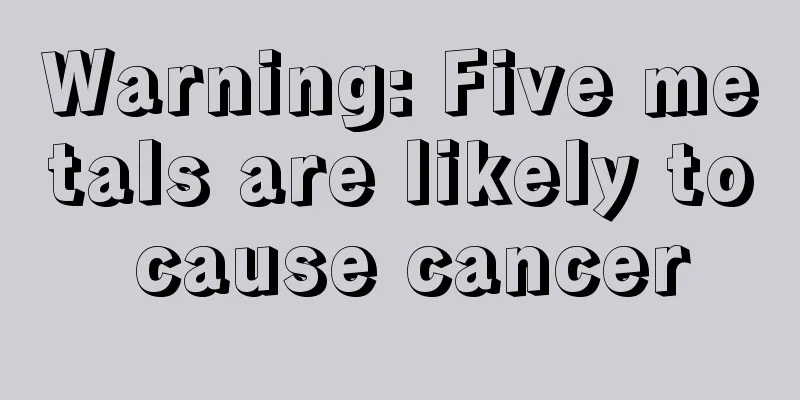How to care for patients with nasopharyngeal carcinoma

|
How to care for patients with nasopharyngeal cancer? Nasopharyngeal cancer is a disease that seriously damages the patient's nasal health and endangers their lives. This disease is very common, and after the symptoms of the disease appear, treatment should be carried out in a timely manner. Nursing work is also indispensable. Let's take a look at the relevant nursing measures for nasopharyngeal cancer. Nursing measures for nasopharyngeal carcinoma Psychological guidance: Cancer patients suffer great pain and suffering physically and mentally, have varying degrees of fear, and lose confidence in treatment. Therefore, nurses should have a high sense of compassion and responsibility, care for and respect patients, and gain their trust. They should understand the psychological state and family environment of each patient, help patients adapt to the hospital environment as soon as possible, enhance their living ability, and achieve the best state of recovery. Lifestyle adjustment: People with nasopharyngeal cancer should avoid physical overwork, such as heavy physical labor, staying up late, and excessive physical exercise, which can cause the body's internal environment to become unbalanced, reduce resistance, and promote cancer recurrence or metastasis. During treatment, you should pay attention to local hygiene, rinse your mouth several times a day, and rinse the nasopharyngeal cavity when necessary. Avoid tooth extraction within one year. Diet adjustment: A balanced diet is recommended. Eat more vegetables and fruits, eat less or no salted fish, pickles, smoked meat, cured meat and other foods containing nitrosamines. Avoid spicy and dry foods and excessive drinking. Especially during chemotherapy for nasopharyngeal carcinoma, patients often experience dry mouth and throat, loss of appetite, nausea and vomiting. Traditional Chinese medicine believes that this is due to deficiency of qi and yin, and excessive heat and toxicity. Avoid spicy and dry foods, and choose foods that are easy to digest, nutritious and delicious. Frequent consumption of salted fish can easily lead to nasopharyngeal cancer: According to scientific analysis, rotten salted fish is a food that directly causes cancer, especially nasopharyngeal cancer. Among people aged 15 to 40 in southern China, nasopharyngeal cancer is more common. People with nasopharyngeal diseases should seek medical treatment as soon as possible. If you find blood in your nasal discharge or spit out blood in your mouth after sniffing your nose, or if you have unexplained swollen lymph nodes in your neck or effusion in your middle ear, you should have a detailed nasopharyngeal examination in time. Early symptoms of nasopharyngeal cancer 1. Bloody mucus: When you wake up in the morning, you often have nosebleeds, or your mucus is light pink, sometimes with blood. 2. Nasal obstruction: Cancerous lesions blocking the posterior nasal aperture or invading the posterior nasal cavity can cause nasal obstruction. It is usually unilateral and progressively worsens, and has nothing to do with changes in the position of the head. Using drops such as Dibijing may temporarily clear the nose, but will become ineffective later, eventually leading to complete obstruction and forcing the patient to breathe through the mouth. 3. Tinnitus and deafness: It is usually unilateral, or develops from one side to both sides. Tinnitus and deafness often occur together, or sometimes they can occur alone. It is often diagnosed as conductive deafness, otitis media, or middle ear effusion, and treatment can temporarily relieve the symptoms, but it will worsen again, and this recurrence will eventually lead to severe deafness. 4. Headache, facial numbness, difficulty opening the mouth, double vision. These symptoms may occur in one, two, or all of them, or appear one after another, from mild to severe, and develop continuously. Headache is mostly migraine, which is progressively aggravated. Facial numbness is often on the same side as the headache. The skin feels numb, tingling, or like crawling insects. The numbness may gradually expand or worsen, which may cause difficulty opening the mouth, deviation, and chewing weakness. After learning the above knowledge, friends already know what the nursing measures for nasopharyngeal cancer are. Nasopharyngeal cancer seriously affects the daily life of patients and brings them considerable harm. We need to pay attention to our nasal health and pay attention to preventing nasopharyngeal cancer, so as to reduce the incidence of the disease. |
<<: Nursing care for radiotherapy reaction in patients with nasopharyngeal carcinoma
>>: How to care for the skin during radiotherapy for nasopharyngeal carcinoma
Recommend
How to treat prostate cancer
Prostate cancer is a tumor caused by malignant pr...
How can liver cancer be treated in the early stage to have a chance of recovery? You can choose these four treatments
Patients with early-stage liver cancer can genera...
What harm does bb slimming and fat-dissolving capsules do to the body?
Many people who want to lose weight but don't...
Is grape seed good for whitening?
Grape seeds have high nutritional value, especial...
Cook the wonton for a few minutes
Since the skin of wontons is very thin, you must ...
Severe atherosclerosis, these are the things you need to know
Atherosclerosis is a serious disease with a high ...
Chinese medicine can cure brain cancer headache
At present in our country, due to the continuous ...
What are the taboos for exercise for lymphoma
Cancer treatment is a long process. In order to t...
Can early-stage colon cancer be cured?
For early-stage colon cancer, if the lesion area ...
The difference between real stomach fire and false stomach fire
Traditional Chinese medicine believes that there ...
How to provide psychological care for lung cancer patients? There are three methods for psychological care of lung cancer patients
For people with lung cancer, psychology is a very...
What are the effective treatments for lung cancer? Four common methods for treating lung cancer
Lung cancer is still a major unsolved medical pro...
What harm does bile duct cancer do to the patient's body
The cure rate of bile duct cancer and the surviva...
Wrist weakness
Whether in life or at work, almost everything req...
Can't have sex if you have uterine cancer?
Can women with uterine cancer not have sex? Women...









